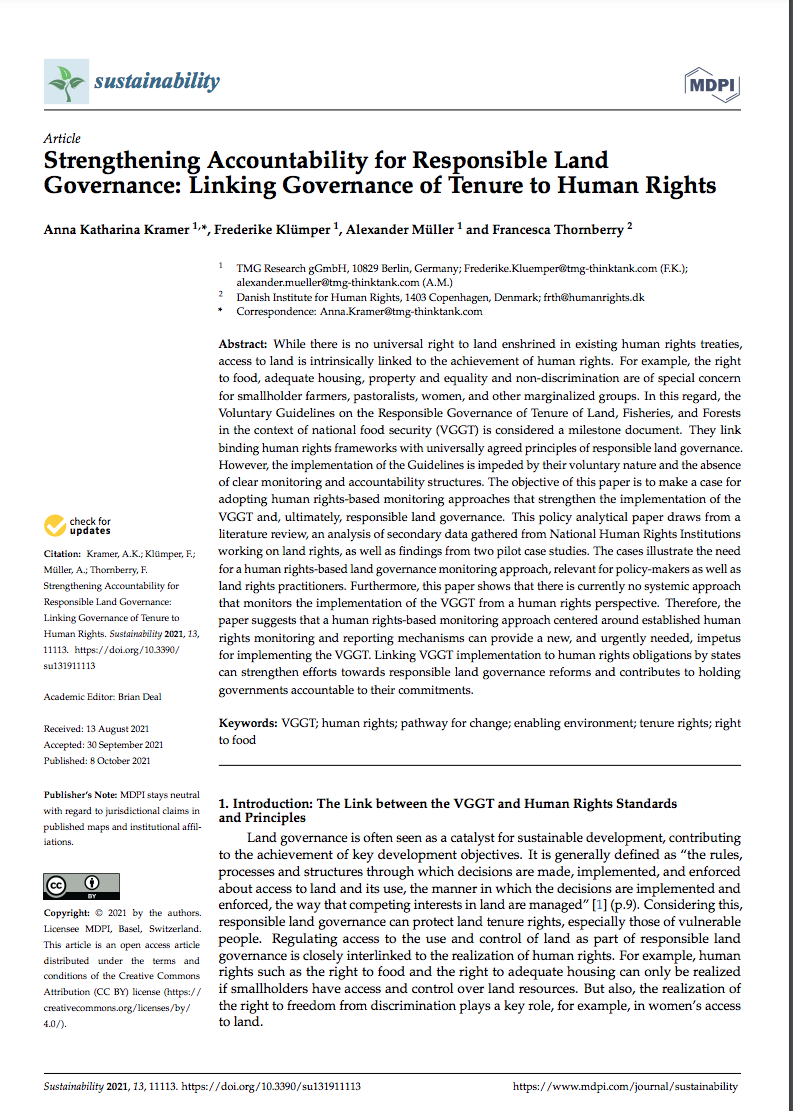Location
MDPI AG, a publisher of open-access scientific journals, was spun off from the Molecular Diversity Preservation International organization. It was formally registered by Shu-Kun Lin and Dietrich Rordorf in May 2010 in Basel, Switzerland, and maintains editorial offices in China, Spain and Serbia. MDPI relies primarily on article processing charges to cover the costs of editorial quality control and production of articles. Over 280 universities and institutes have joined the MDPI Institutional Open Access Program; authors from these organizations pay reduced article processing charges. MDPI is a member of the Committee on Publication Ethics, the International Association of Scientific, Technical, and Medical Publishers, and the Open Access Scholarly Publishers Association (OASPA).
Members:
Resources
Displaying 656 - 660 of 1524An Overview of Frontier Technologies for Land Tenure: How to Avoid the Hype and Focus on What Matters
Secure land and natural resource rights are key ingredients for rural transformation, social inclusion, and the realization of the Sustainable Development Goals. In many cases, these rights are not formally recorded, and statutory land administration systems are inaccessible to rural communities.
Forest and Land Rights at a Time of Deforestation and Climate Change: Land and Resource Use Crisis in Uganda
Globally, nations are targeting to achieve the “Green Deal 2030” and “Biodiversity Strategy 2030” to protect and conserve forest ecosystems. Forest land rights that define the nature of forest use have been rendered useless in many developing countries. Uganda is an African country endowed with tropical rainforests. Forests and other protected areas continue to decline due to deforestation and forest degradation in Uganda. Moreover, Uganda is an example of a country with a high allocation of virgin forest land to investors for development projects including agriculture.
Modeling Cultural Keystone Species for the Conservation of Biocultural Diversity in the Afroalpine
Climate warming threatens the future sustainability of mountains, and tropical mountains are particularly threatened with loss of biodiversity and associated ecosystem services. Conservation biologists increasingly turn to habitat suitability models to guide the establishment and assessment of protected area networks to protect the highest number of species, yet this focus often neglects the values, attitudes, and beliefs of the people living around protected areas.
Strengthening Accountability for Responsible Land Governance: Linking Governance of Tenure to Human Rights
In a new paper, written with a colleague from the Danish Institute for Human Rights, TMG researchers Anna Kramer and Frederike Klümper, and TMG Managing Director Alexander Müller, make a case for adopting human rights-based monitoring approaches that strengthen the implementation of the Voluntary Guidelines on the Responsible Governance of Tenure of Land, Fisheries, and Forests (VGGT), and ultimately support responsible land governance.
Fit-for-Purpose Land Administration—Providing Secure Land Rights at Scale
This Special Issue provides an insight, collated from 26 articles, focusing on various aspects of the Fit-for-Purpose Land Administration (FFPLA) concept and its application. It presents some influential and innovative trends and recommendations for designing, implementing, maintaining and further developing FFP solutions for providing secure land rights at scale. The first group of 14 articles is published in Volume One and discusses various conceptual innovations related to spatial, legal and institutional aspects of FFPLA and its wider applications within land use management.





